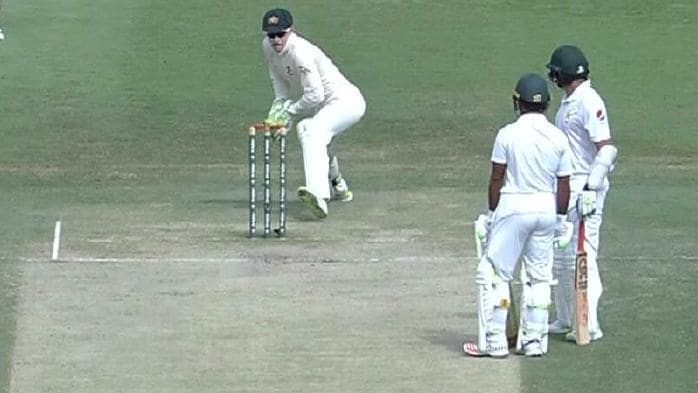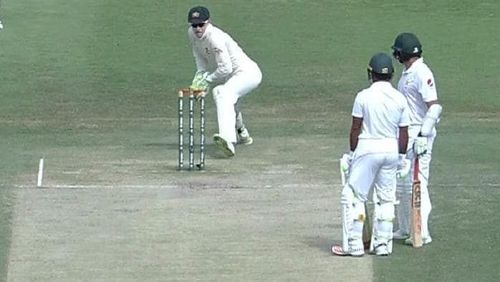
Azhar Ali's bizarre run-out evokes memories of Dhoni's recall of Ian Bell

The Pakistan batsman Azhar Ali got out in a bizarre manner in the ongoing second Test between Pakistan and Australia at Abu Dhabi.
In the Pakistan second innings, when Azhar Ali was batting on 64, he sneaked one past gully and thought that the ball had crossed the boundary. But due to the slow nature of the outfield, the ball stopped near the boundary ropes.
Without following the course of the ball, both the batsmen at the crease, Azhar Ali and Azad Shafiq were busy in a casual mid-wicket conference. Meanwhile, Mitchell Starc picked up the ball and threw it to the wicket-keeper Tim Paine to effect the most bizarre run-out. Azhar Ali was shell-shocked by the turn of events which happened right under his nose.
The bizarre run-out of Azhar Ali evokes memories of Ian Bell’s similar bizarre run-out and the Indian captain Dhoni’s subsequent recall of Bell. This happened on the third day of the second Test between India and England at Trent Bridge in 2011.
Luckily for Ian Bell, his bizarre run-out happened at the stroke of tea which gave time for England to impress upon the Indian captain Dhoni to withdraw the appeal.

The incident happened when Ian Bell was batting on 137. The batsman at the other end was Eoin Morgan. Morgon glanced the last ball before tea to the deep square leg where Praveen Kumar fumbled with the ball but succeeded in stopping the ball from going over the fence.
Bell thought the ball had crossed the fence and joined Morgan on his walk back to the pavilion for tea. Strangely, the umpire had not called over and tea.
In the meanwhile, Praveen Kumar recovered and sent back the throw to the striker's end where Abhinav Mukund effected the run-out. On an appeal made by the Indians, the third umpire gave Ian Bell out after replays showed that Praveen Kumar had kept the ball within the playing area.
During the tea break, the England captain Andrew Strauss and coach Andy Flower went to the Indian dressing room and requested the Indian captain Dhoni to withdraw the appeal to uphold the spirit of the game.
Dhoni was graceful enough to accede to their request and this was communicated to the match referee, umpires and the players concerned. Ian Bell came out to bat after tea. From 137 Bell went on to score 159. In the end, England won that Test by a huge margin of 319 runs.
The difference between Ali and Bell’s run-out was that in the case of Bell's dismissal it was the last ball before tea and Bell thought the umpire had called for tea. But in Ali’s case, it happened right in the middle of the over, the third ball to be precise. Hence, there was no such confusion of the over coming to an end.
The similarity in both the cases was that both Ian Bell and Azhar Ali were reckless as batsmen and were not living in the present. The first thing a school coach would teach a young kid is to stay put at the crease and not to wander around.
When a ball is hit in the outfield, the batsman is expected to keep running till the ball crosses the ropes. But both Azhar and Bell forgot the basics and took things for granted and never had the game awareness to realize what was happening around them.
This leads us to another interesting question – Whether a batsman can be run-out when not attempting a run? But in these two cases, the batsmen had initiated the process of running between the wickets and the process could be stopped only after the ball had become dead. While the ball is in play, if the batsmen decide to take things easy, it should be at their own peril.
Another relevant query is whether Dhoni was right in calling back Ian Bell. Well, Dhoni did the right thing to uphold the spirit of the game. Besides, Dhoni had sufficient time to think over and decide. Had it happened during the flow of the game, Dhoni might not have withdrawn his appeal.
To conclude, it is the responsibility of the batsman to stay put at the crease. The opposition team would be justified in converting whatever little opportunity they get to dismiss a batsman. The fielding team would be well within their rights to do so.